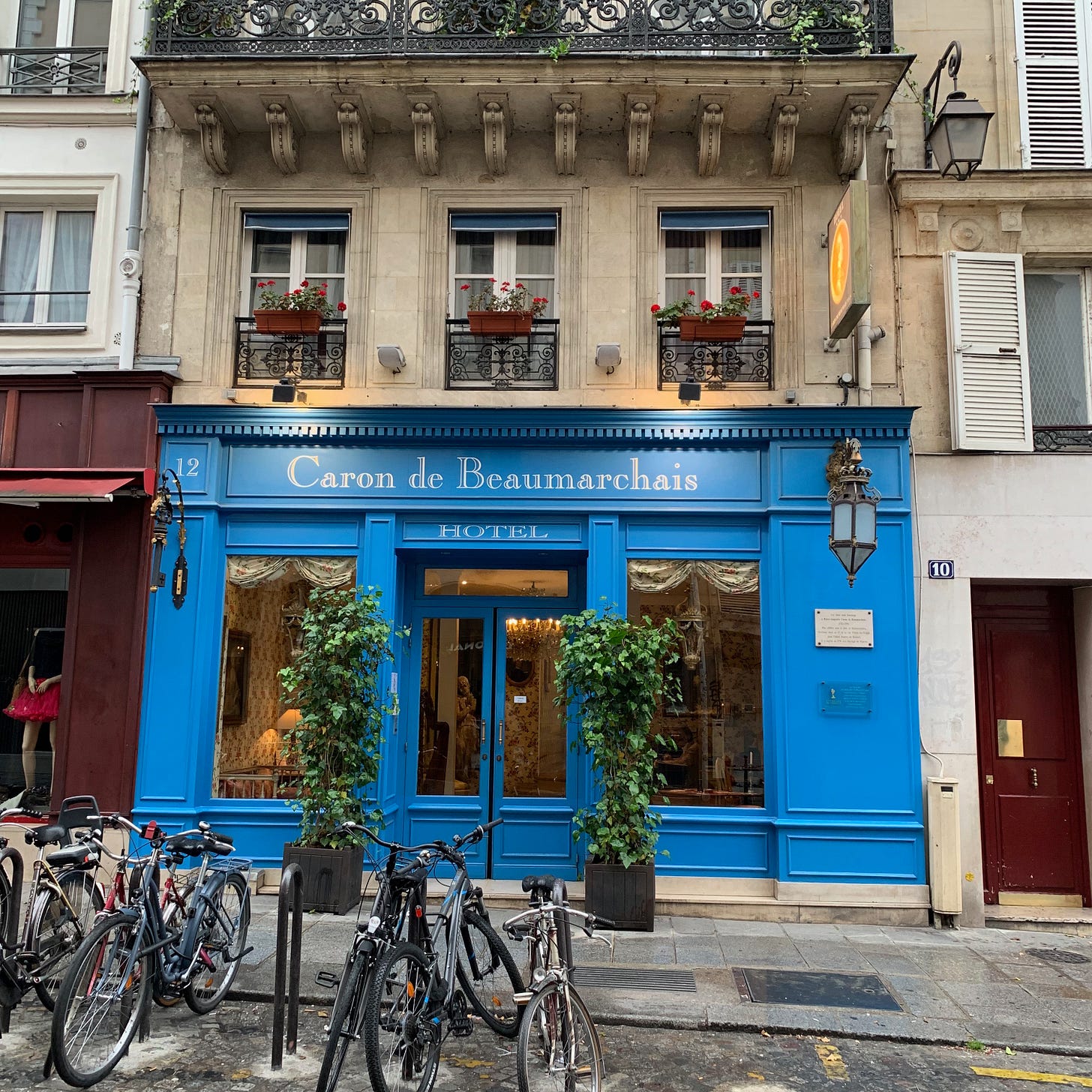There are many big cities in the world — but great cities? For me, the definition of a great city is one that mixes all walks of life, that has a place for everyone, that allows anyone who wants to call it home to feel at home. It’s one that inspires and nurtures its thinkers and dreamers, and offers the scope to live out those dreams, but it’s also a city that cares for its workers — those in essential trades, such as cleaning, teaching, nursing, baking …
So I was fascinated to read an article in The New York Times that gave me just one more reason to love Paris. In ‘How does Paris Stay Paris? By Pouring Billions of Dollars into Public Housing’, journalist Thomas Fuller reports on Paris City Hall’s ‘ambitious and aggressive efforts to keep middle- and lower-income residents and small-business owners in the heart of a city that would otherwise be unaffordable to them — and by extension, to preserve the ineffable character of a city adored by people around the globe.’

Paris, like many of the world’s other ‘superstar cities’, is being rocked by market forces that all too easily turn a city into an enclave for the wealthy, who often snap up pieds-à-terre only to leave them empty for most of the year. Severely restricting short-term rentals — which means private landlords are more likely to rent out their investments to full-time residents, which in turn helps a neighbourhood remain just that — has been one Parisian battle in the war against what many other cities might see as economic inevitability.
City Hall also strives to maintain mixité sociale through public housing. It has the legal right to pre-empt the sale of most properties; this enables it to redevelop old buildings or sites for low- and middle-income housing. One-quarter of Parisians now live in public housing, with the aim ‘to have 30 percent public housing for low-income residents and 10 percent for middle-income residents by 2035.’
What’s more, Paris’s City Hall happens to be the landlord of 19% of the city’s shops, which allows it to ‘socially engineer’ the city. This means, writes Fuller, ‘protecting the petits commerces, the small shops that contribute to the city’s sense of timelessness. When visitors here meander through what seems like a series of small villages, with boulangeries, cheese shops, cobblers and mom-and-pop hardware stores, it is not entirely organic.’ Fuller notes that City Hall constantly studies its neighbourhoods to get the balance of essential shops right, and chooses its tenants strategically, be they violin restorers, florists, niche booksellers, or cheesemongers.
At the risk of sounding overly sentimental, I became a little teary while reading this article. We all know that Paris is beautiful on an aesthetic level. But I’ve long felt that Paris’s beauty is more than skin-deep. This article proves that Paris has a soul that all too many big cities lack. It’s a city that knows it’s much more than the sum of its stones, that it’s also about the lives of those residing within these stones.
I love that Paris respects its workers, that it’s bringing public housing into the inner-city mix so that more people can have the dignity of living close to their work, and also enjoy the city they help to run. I love the fact that their kids are growing up in such an inspiring city. That they will see that their city is wide open to them, that they will be respected no matter what path they choose to take in life.
I also love the fact that Paris inspires grandeur, for want of a better word, for those who want to pursue it. For this is the city where you walk in the literal footsteps of so much greatness. Where every second building seems to have a plaque boasting about a one-time A-list resident. Surely Simone de Beauvoir and Jean-Paul Sartre were all the more driven for having grown up in the city of Voltaire and Diderot?

Paris has long been a place that has encouraged and cherished genius. I was reflecting on this recently while writing about Antonin Carême, the original celebrity chef, that magician of pastry who gave us the croquembouche and vol-au-vent, who perfected millefeuilles and meringues, who codified the sauces of French cuisine, and so much more.

Carême was born in 1783, into a large, desperately poor family, in slum housing. During the Reign of Terror, when he was not yet ten years old, Carême’s father abandoned his son to his supposed fate at the nearby city gates. But little Antonin had other ideas. He literally climbed out of the gutter, found himself a job in a chophouse, and hauled himself up the culinary ladder, reaching one career pinnacle after another: working for the star diplomat Charles-Maurice de Talleyrand, opening his own pâtisserie on Rue de la Paix (no less), writing a string of influential cook books, baking the cake for Emperor Napoléon’s second wedding, cooking for the Prince of Wales, Tsar Alexander I, and the Baron de Rothschild … It’s an incredible story — almost literally so. To read the brilliant Cooking for Kings: The Life of the First Celebrity Chef, Antonin Carême by Ian Kelly is to shake your head that this extraordinary life actually happened. No wonder Apple TV has announced an upcoming biopic based on this book.
Another astonishing Parisian rags-to-riches tale is that of Pierre-Augustin Caron de Beaumarchais, who rose from humble beginnings (living behind his father’s clockmaking studio) to become one of the most fascinating of French men; not only was he himself an inventive clockmaker, but a musician, comedian, playwright, poet, publisher, entrepreneur, policy maker, courtier, spy, gunrunner … I also wrote about his exceptional life recently: ‘In Search of the Paris of Pierre Beaumarchais, Playwright of The Marriage of Figaro’.
There are so many others you could add to this ‘only in Paris’ list: the philosopher, mathematician and co-editor of the first French encyclopedia, Jean-Baptiste le Rond d’Alembert, whose mother abandoned him on church steps as a baby; Sarah Bernhardt, scandalously born to a courtesan mother and anonymous father, yet who became the greatest French actress of all time; Coco Chanel, who ventured to the French capital to escape her pauper past and forge a new and exciting life for herself — not to mention remaking modern fashion and perfumery, too ... (Genius doesn’t equate to moral greatness, sadly, as Chanel’s collaborationist behaviour during the Second World War proves.)
There’s an ethical argument for why a city should nurture all classes, of course. But there’s an economic one, too. As Paris knows, we need our essential workers, who so often have to toil on pay that does not reflect their civic importance. But also, as the ghosts of Carême and Beaumarchais would tell us, genius can come from anywhere — from public housing to palatial townhouses. The child who has the potential to, say, cure cancer or reverse climate change — she or he is out there somewhere.
Whether one’s dreams are in medicine or music, science or soccer, food or fashion, literature or architecture, every citizen should have the chance to live their ultimate life. Lucky are those citizens who live in a city that understands this. (And who live in a country that believes in the importance of accessible childcare, public education, and free healthcare, which, in addition to affordable housing, are key ingredients in the recipe for a happy, productive society.)
I know that, yet again, it sounds like I’m seeing Paris through my rose-tinted glasses. No city is perfect, of course. Every big city has its troubles and complexities. But no big city seems to work as hard to be better socially, to keep and care for its soul, as Paris does. And that, for me, is what makes this city truly great.
Until next time,
Katrina 🇫🇷














Great information about Paris and city government.